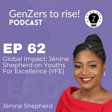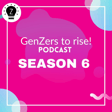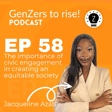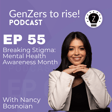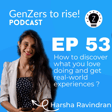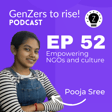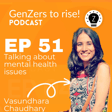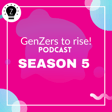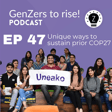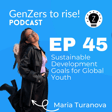Become a Creator today!Start creating today - Share your story with the world!
Start for free
00:00:00
00:00:01

Passion's perils: Crafting purposeful Mission statements for life with John Mendez
In this episode we talk with John Mendez, the host of the Walk 2 Wealth Podcast. We discuss why passion can lead you astray. We also talk about creating a mission statement in alignment with your purpose as well as about the two most important days for every person.
This episode is all about a purpose driven life.
You can connect with John Mendez at https://lnkfi.re/john-mendez
Follow GenZers to rise! https://go.changemakerz.org/follow
Episode's page https://podcast.changemakerz.org/john-mendez
Access exclusive content on the ChangemakerZ app at https://app.changemakerz.org
Produced by Vasilis Skarleas
Transcript
Introduction to Change Makersly and Gen Z Entrepreneurship
00:00:01
Speaker
Hello everyone, I'm Saloni. And I'm Vassilis. We run Change Makersly, a student room initiative that aims to empower, educate, and connect Gen Zers interested in entrepreneurship. We interview teenagers with impactful projects and create resources to help you change the world. If they can't do it, so can he.
00:00:23
Speaker
On this podcast, we discuss logistics of creating different types of projects with Gen Zers who have already done it. We will leave our social media and website information in the description.
Introduction to Janitorize Podcast Season 5
00:00:44
Speaker
Hi, everyone! Welcome to another episode of the Janitorize podcast.
John Mendes on Leading a Purpose-Driven Life
00:00:48
Speaker
We are already in Season 5, and today's episode is all about to lead a purpose-driven life. With me in the studio is John Mendes, the host of the whole two worlds podcast. John, welcome to the show, so nice to meet you. Like you guys, I'm also a GenZer myself, so I was excited to be able to hop on a podcast and get to connect with you guys.
00:01:08
Speaker
Thank you so much for being with me today. It was so good to me. So we have like our conversation today is going to be about driven life. And to begin this, we would like to tell us what's your podcast all about and share part of your background. Yeah, so a little bit about me. I grew up in a project. I grew up nine people in a two bedroom. My father was absent. My mother suffered from mental health issues. So growing up,
00:01:34
Speaker
not being able to understand. That's hard to grasp as a kid, mental health issues. So me and my mom never had the best relationship growing up. And my grandparents who immigrated from Dominican Republic raised
The Power of Entrepreneurship and Personal Control
00:01:45
Speaker
me. So 30 years here in this country, they still only know probably about five words in English. So I had a good time being raised. It was super fun, super typical Dominican household. And for me,
00:01:58
Speaker
Growing up, I know you guys talk about entrepreneurship here on the podcast. It's not something that I definitely was talked about. Money was never talked about, business never talked about. So for me, fast forward a little bit. Now, this is spring 2020 when the pandemic took over. I was in my freshman year of college, and around fall,
00:02:17
Speaker
I was, I found my way into Barnes and Noble. I picked up three books, one of which was rich that poor dad. And then from there, I jumped down to personal finance rabbit hole. I started listening to more podcasts, reading more books, looking up, you know, how to build my credit, how to invest in index fund, which bank accounts that I use. And from there, I came back spring 2021. It's like I had seen the light and I was like, you know, I can't go back to taking these regular genetic classes. Mind you, everything was from home. Everything was on zoom.
00:02:45
Speaker
So I was like, I can't go back to taking these generous classes that aren't really teaching me anything after I'd untaught myself all this stuff about entrepreneurship and money. I was like, you know, with the whole world being uncertain, the only thing I was certain of was myself. And so for me from there, I got into entrepreneurship and I never looked back. That was spring 2021.
00:03:04
Speaker
December 2020, I dropped the trailer for Walk to Wealth. The story behind it is for the 99% of us that aren't overnight sensations, it's a long walk to wealth. And some may walk faster than others, but what good is sprinting to the finish line if you pass out when you cross it? Oh, wow. I don't know from where to start. First of all, what's entrepreneurship for you? Like, what do you like about entrepreneurship?
00:03:31
Speaker
The thing I like the most really is the fact that you can take life into your own hands. You are the absolute controller of your destiny when you're an entrepreneur. And when you're an entrepreneur, it allows you the freedom to live life how you decide.
00:03:48
Speaker
the dark side about that no one seems to talk about is that we're great responsibility or great power comes great responsibility and the same you're not gonna have someone telling you what to do not gonna have a boss over you and so there's hard to get accountability so you could very much
00:04:04
Speaker
start a business and then fail and then and just find your way back into a corporate job a traditional job nothing any anything bad about it just to completely separate roads and so for me entrepreneurship I just love that I can
00:04:19
Speaker
I know that no matter what happens I can look myself in the mirror and the person I see in the mirror is responsible for whatever happened whether it's good or bad I know I'm responsible for it and I could take a life into my own hands and that is the best part about entrepreneurship for me is the fact that I can really just
00:04:36
Speaker
decide how my life ends up playing out and whether I become a massive success or a massive failure, I sleep better at night knowing that I'm responsible for it versus living life in the middle and having a boss or an employer responsible for how much I grow or how much I don't.
Taking Risks and Finding Purpose
00:04:55
Speaker
I understand what I'm saying and I love this perspective because I think that I'm on the same mindset
00:05:03
Speaker
Let's say that, you know, you have accomplished something, you're running a business and company something. And in the end, you're also proud for yourself that you have done this. You may have taken the risk and in the end you succeeded. And even if you didn't succeed, you gathered some experiences to know, to remember during, you know, the rest of your life and not do the same mistakes again.
00:05:29
Speaker
Yeah, and it's one of the things where it's like, when you take that risk, it's so rewarding. Because it's when you take these great risks that you didn't actually experience big growth in your life. And if you play life on the fence and you never take any risk, you'll never ever be able to fully experience what life has to offer. Yeah, I agree with you. An interesting subject is why passion can lead you astray? What's your point of view on that?
00:05:57
Speaker
Yeah, so passion, passion is one of those buzzwords that everyone likes to throw around. Everyone tells you pursue your passion, make your passion your business. Passion is like the main big thing that everything
00:06:09
Speaker
Yeah, exactly. The only thing different with passion in your dream is the dictionary definition of passion is a barely controllable emotion. Now, the reason why passion could lead you astray is because like all other emotions, passion comes and goes. That's why marriages that are built on passion always end up in divorce because inevitably fade. And so when it does fade, if that is the sole thing that is the foundation of everything that you do,
00:06:36
Speaker
and it fades now your life has no meaning and you're stuck because you spent all your time energy effort blood sweat and tears pursuing this one thing and just like that it vanishes and now you're stuck having a midlife crisis or a quarter life crisis and you don't know what to do with yourself because the thing you are orienting your life around is you're no longer feels the same
00:06:58
Speaker
So what passion leads you astray is that most people put their own spin on it. Most people put their own spin on how they dress, how they appear, how they do business, and another thing that people do is put their own spin on words. Words have
00:07:13
Speaker
concrete definitions. If you look up in a dictionary, a word will have its own definition. And most people have their own definitions for passions. That's why passion leads people astray. Because everyone has their own definitions where I don't know what a passion really is. Passion is just an emotion. And now not saying that passion is a bad thing, but what you have to be careful of is making passion the foundation because it's equivalent to building a house on sand.
00:07:38
Speaker
Yes, you're on the beach. Yes, you're by the water, but you're only one high tide away before the house comes crumbling down. I totally agree with you. But I never thought about it before, that fashion could be a sound foundation for your project, maybe. I could say that, I don't know, what do you would say that is a good foundation to base your project, for instance?
00:08:08
Speaker
your purpose, and you can use your passion to help uncover your purpose. Now, listen to the words I'm saying, uncover your purpose, because you don't find your purpose. A lot of people our age think it's something they have to find. No, our purpose or calling is usually something already built within us that we may not know or hear yet, because we have so much, so many onion layers that we have to peel back in order to get to the root of who we are. And a lot of the times,
00:08:38
Speaker
What our purpose is, or what our calling is, it could either be the kid that we were when we were growing up before the trauma, before the indoctrination, before the experiences, whatever we faced growing up, usually that kid, that innocent kid that we were before life happened, before we became adults, right? That's usually who we were meant to be. That is usually the us that we have to get back to.
00:09:06
Speaker
Your purpose could also be something that you were missing, a gap that you had in your life that now you want to fill in the life as well there. So for me with the podcast, talking about financial literacy and thinking abundantly, I had a very much scarcity mindset growing up because all I knew was scarcity. I grew up in a projects. We didn't grow up with money. We grew up with Section 8. We grew up going to having free lunch in school.
00:09:29
Speaker
So for me, all I ever knew was poverty. All I ever knew was scarcity. So once I started learning and I started breaking free from that mindset, I was like, sheesh, I gotta start helping other people my age that grew up like me and went to inner city schools and went to, you know, grew up in the projects and have government assistance and didn't have their parents. I gotta start helping other young people like me.
00:09:49
Speaker
learn what I'm learning right now while I'm learning it, because that could, this is how my trajectory in life has changed. And it's only been about two years since I read first read Rich That Poor Dad. Imagine how other people's lives could change if I started teaching them this stuff now, so that they didn't have to go through my journey that I went through to learn all this
Building Confidence and Understanding Strengths
00:10:09
Speaker
stuff. And they can just kind of shortcut their progress and the speed at which they're moving. That's interesting.
00:10:17
Speaker
I think that many people try to find a purpose, but at the same time, when they find a purpose, they don't have confidence to move on with that purpose. So how can we construct confidence with ourselves in order to build this foundation and then move on with the project?
00:10:39
Speaker
Yes, so confidence, if you look at the root of the word confidence, right? Cone, right? C-O-N means with. And fiancia means trust. So what does confidence mean? It means with trust. So someone who has high self-confidence has high trust in themselves.
00:10:58
Speaker
Right. So the more you trust yourself, the more confident you are. And if you don't feel confident to go talk to that girl, to go start that business, to go do that thing, or quit your job, or drop out of college, or do whatever it is that you want to do, but are on the fence on.
00:11:14
Speaker
The reason you don't have confidence is because you don't trust yourself enough with that opportunity. And so the more you trust yourself, the more you become someone who follows through on their word, the easier it'll be to do a lot of these things because you have built up that trust with yourself. And that is essentially confidence. It's you trusting yourself to someone who has high confidence, has high self trust.
00:11:42
Speaker
Do you think that when we have high self-confidence and high self-trust, sometimes maybe we can get into a trap thinking that, yeah, I know it, yeah, I can do it, but in the end, you have a misconception of what your capabilities, like this haven't happened to me, but I know people that they were in this type of trap and it was difficult to get out of it.
00:12:11
Speaker
Yeah, so confidence, confidence is really just trusting yourself with the opportunity with the situation. Now, a lot of people are very confident and end up getting themselves doing something that they can't do. But it also comes to knowing your weaknesses, knowing where you fall short, knowing where you're not strong at, right? You should know your weaknesses more than you know your strength.
00:12:34
Speaker
And that gives you enough awareness, enough clarity as to, for example, I know right now I have a lot of confidence, right? But I'm not going to go and do a backflip, although I used to flip, right? And if you catch me at a trampoline park, I could still do a punch of flips. But if you're going to catch me on ground, I'm not going to do a backflip, even though I probably could land it if I were to try. But
00:12:57
Speaker
I know that that's not an area that is longer, any longer my strong suit. So although I have the confidence to do so, I also am not an idiot. So I'm not going to do things that I know that may get me hurt. But then again, also when it comes to business, you may fail. You may lose a lot of money.
00:13:15
Speaker
But sometimes you have to go through with it. And there's never failures in life. There's only lessons, right? So sometimes you have to try some of these things and learn from your mistakes, because life is the best teacher. And sometimes you may be super confident and super arrogant. And there's a difference right between confident and arrogance. But sometimes it backfires and sometimes it does fail. And then you have an opportunity to learn and grow from there and then adjust.
Crafting a Purposeful Mission Statement
00:13:42
Speaker
I see. So like,
00:13:45
Speaker
I keep the following points that if you want to do something, you have to take risks. That's for sure. You have to have confidence, but on the same time, you have to be careful not to get into this trap that can lead you to this misconception that everything can be done without taking risks or anything else.
00:14:09
Speaker
And, like, you have to have the knowledge or the understanding that if something is going to hurt you, like, for instance, let's say that's a friend and you're very good friends and says, okay, let's go and get off the cliff, like a cliff without, you know, anything to protect you. So you want to go and get off the cliff because that's an idiot. That would be an idiot if you haven't been doing that.
00:14:38
Speaker
I think that this is really, really important. While I was researching this episode subject, I jumped into the word mission statement. So what is it?
00:14:55
Speaker
yeah so a mission statement pretty much is something that orients your life and you use your purpose kind of to make this mission statement and so what it is it's pretty much a one-liner that you could use
00:15:09
Speaker
in any situation. So mine is my mission in life is to enlighten and empower young adults to build wealthy abundant lives. And so for someone that wanted to create a mission statement, it's my mission in life is to then you would throw in a verb like what do you want to do, help, teach, coach, inspire, educate, whatever it may be, then
00:15:32
Speaker
blank. The next blank is your target audience. So it may be coach young adults, it may be coach professors, it may be coach business owners, right? Who's your target audience? So the first step is the action word and the second step is your ideal avatar. Who do you want to help? And then the third step is how you're going to help them, right? So it's pretty much it's what you're doing, who you're doing it for,
00:15:56
Speaker
and how you're doing it for them, right? And that's pretty much your mission statement. Yeah, and so your mission in life is something that transcends you. If it's something that you can accomplish in a lifetime, it's a goal. Now there's very big difference between a mission and a goal. A mission is something that you're always going to be in pursuit of. A goal is pretty much the checkpoints along the way that you're gonna hit. So maybe 10,000 a month or 20,000 a month or 150 people helped or 150 homes.
00:16:23
Speaker
built for charities and shelters. Like, those are goals. Your mission is for me and not even empower young adults. I'll never be able to help all the young adults in the world because there will always be more young adults, right? I can never ever help all the young adults. That is a mission, something that transcends you, something bigger than you. But of course, there's milestones and goals along the way. Let's imagine that my mission avatar is, you know, a specific group of people.
00:16:51
Speaker
Is there any problem if this mission avatar becomes something more global? For instance, when we started this podcast with couple of friends,
00:17:04
Speaker
The main idea was to educate teenagers about a tetanus event, but today the mission has changed to something a little bit more general and it's like my mission statement right now is inspire
00:17:24
Speaker
the world through this podcast. So is there any problem if our mission avatar is not so specific?
00:17:35
Speaker
There's not really a problem. For marketing purposes, the more niche sound, the better. But like, for example, young adults is not a specific type of young adult. It's just for me. I want to help the me from two years ago. So it's like I was a young adult, so I'm just going to help other young adults like me. And that's what I feel called to do. And how you live out your mission, like I'm always going to be educating in some way, shape or form. I feel called to educate.
00:18:00
Speaker
Whether it's through podcasting, whether it's through public speaking, whether it's through coaching, whether it's through... So that may change, right? But the theme that you're doing is never going to change. How you're doing it might change, though. You're probably going to be inspiring. It may be the world. It may be your friends at home. It may be your city. It may be your state. It may be your country. It could be Latinos. It could be whatever it may be. But also,
00:18:29
Speaker
how you're doing it may change as well, maybe through this podcast. But let's say maybe a year from now, this podcast jumps to the moon. And now you're getting speaking engagements to go speak on stages with 100,000 people in attendance, right? So it's like, how you started doing it, it may change. But for the most part, you're still, you know, inspiring other people. Hmm.
00:18:51
Speaker
We'll say that we found the purpose in our goals, life, etc. Which are the steps that lead us in creating a mission statement in alignment with this purpose?
00:19:03
Speaker
Yeah, so the four simple easy steps to find your purpose, right, is take a pen and paper and write down what are all the things you love to do. The things that you would do if no one ever paid you for the rest of your life. Write down all those things. The things that you would do that you love to do and whenever you're doing them, time, it feels like time stops. Then the second step is to write down all the problems you feel that the world needs solving.
00:19:29
Speaker
could be global warming, could be climate control, it could be poverty, it could be financial literacy, like what I'm doing, it could be advocacy, whatever it may be. Write down all the problems you feel compelled to solve. And sometimes the thing that annoy you the most might be the things that you need to actually solve because if they annoy you, it means you probably care about it. So if they know you a lot, you probably have a lot of care about it, right? So that's a good marker, just kind of a signal to use.
00:19:55
Speaker
The third step is to write down all the things you can be rewarded for. A lot of times we do charity or volunteer work and it's fulfilling. It brings us joy, but we still have to keep the lights on. We still have to put food on the table and make ends meet. And then the fourth step is write down all the things that you're good at.
00:20:11
Speaker
or other things that you have the aptitude to be good at. And they're just saying the fish is always the last one to see is in realizes in water. Sometimes you need to have people from outside look at and tell you what are some of the skills that you have because the skills that we may seem are regular to ourselves because we're in similar age groups.
00:20:29
Speaker
Another age group may look at it entirely different and be like, oh my goodness, you know, social media, I don't know how to even press a button on social media. I could use your help and you may not be a social media expert, but you know more than they do and they need help. So that was the four steps.
00:20:47
Speaker
about the fourth step. I love this perspective and at the same time I think that we could extend it to something even bigger like you could have a third person to tell you like what could be improved
00:21:04
Speaker
in something that you are already working on, because they have a totally different perspective on that. But for a mission statement, I think that these are the best steps that everyone could follow along. While we were preparing this episode, you mentioned something really interesting. You talked about the two most important days for every person. Would you like to dive deeper on that?
00:21:34
Speaker
Yeah, the two most important days are the day you were born and the day you find out why. And most people never live to see the second. A lot of people right now aren't living, they're just breathing. And most people never, ever wake up from this with their life. They just stay on autopilot. And so many people talk about what it is that they would die for. But that's easy, right? Everybody dies. You don't have to try to die. We're all gonna die whether we realize it or not.
00:22:01
Speaker
or whether we want to or not. But what are we living for? Why are we living for? What is it that pushes us? What is our why? What is our purpose here? A lot of people never live to see the second day because they never spend time thinking about it or pondering around questions like that. It's like, why was I put here? What am I truly called to do? Who am I truly called to serve?
00:22:24
Speaker
Yeah, let me think about that. Like, I think that I have already, you know, create an idea of why I am living, but I never, you know, processed it and say, or verified that, yeah, this is why I'm living for. But personally, definitely I have, you know, a purpose, but I don't know if it's the only purpose.
Resilience and Credibility in Public Speaking
00:22:51
Speaker
Do you have any quote that you find motivational?
00:22:55
Speaker
If life was easy, it wouldn't be worth living. God gives His best soldiers the worst missions. We're going to face a lot of hard times in His life. We're going to face a lot of obstacles. We're going to face a lot of trials and tribulations. But know that despite all the suffering, despite all the hardship that we may face in encountering this lifetime,
00:23:12
Speaker
that we were designed in a way to transcend all of that and to thrive and to flourish so know that we are built for this not just to survive but to flourish to spread our wings and fly out so stay strong and know that no matter what storm you're going through that it'll eventually end
00:23:34
Speaker
This was quick and I love it on the same time. We talked about a little bit about social media, specifically about how someone that's an older age, not someone younger age. Do you have any piece of advice about people trying to grow public figure, their public figure through the social media accounts?
00:23:57
Speaker
Yeah, I would definitely say start speaking more. People are terrified of speaking. So if you just start posting videos of you speaking, people are going to definitely take a notice of that. And if you start taking photos of you in front of people speaking, even if you're just in front of a group of friends and you have someone take a photo and you're standing up in the middle, people see that and you look like you're a lot more credible because it's like you're speaking in front of people. They think you're public speaking and more people fear public speaking than they fear death.
00:24:25
Speaker
So if you can get in front of a stage, people are already going to think of you as a credible person because of the perceived value. And so if you want to take a step further and start guesting on podcasts, find a message that you feel very confident and comfortable speaking on, and then start pitching people to hop on podcasts and share your message. And then start sharing those episodes so that people can see like, hey, you're being interviewed. Hey, people are interviewing you, and then you're going to look even more credible.
00:24:55
Speaker
I can verify that. I can also say that I am terrified in VAT that I have to present myself through social media when I'm doing the podcast. But this is why we found an indirect way to do this.
00:25:14
Speaker
Like, for instance, in the beginning of the show, it's two years ago, where we had the posts about every episode. It was only the title, some colorful lines and the guest's name. And, okay, it wasn't the best post, but it had some attractions.
00:25:37
Speaker
But then we said, okay, let's do this more interesting and let's add some photos of the guests so that people can visualize what they're going to hear. Number one and number two, if they want to connect to the guest, they can create, you know, they can communicate better with it.
00:25:55
Speaker
So when we did that we saw a huge increase of interaction and engagement because there was a person presenting you know the title and nowadays while I'm running a startup here in France about online products
00:26:16
Speaker
We're running a YouTube channel about this startup, and we're using it in the same way that we're using TikTok.
Episode Conclusion and Call to Action
00:26:24
Speaker
We're running short videos, up to 60 seconds. And since the day one, we have a dedicated person that is creating this content
00:26:36
Speaker
and we can see a huge improvement only with these 30-50 seconds of videos we are counting about 12 hours per viewer viewing per 30 days
00:26:54
Speaker
to sort videos that they will have now maybe some type of imagery or other information content and this also makes the company more credible as you said and this is what I love about public spending even if I'm afraid to do it personally. So last question, is there anything else you would like to share with us today?
00:27:23
Speaker
Last thing I'll leave you guys with is this. When you're born, you look like your parents. When you die, you look like your choices. Choose to live a life that's worth living.
00:27:36
Speaker
So I think that this is the end of today's episode. We had such an interesting conversation about losing control of human life. I'd love to thank John for being with us today. Thank you so much for the opportunity. It was a pleasure being here and I'm glad to have a conversation with someone else that's close to my age that trying to make a big impact in the world.
00:27:55
Speaker
Guys, the new Chainsmokers app is now available on the App Store and Play Store. Install it today and take access to all the Tensor Strides content organized based on seasons. Moreover, you can discover other February and December podcasts, including Amazon's podcast. Now, you can also share your favorite episodes, podcasts, articles from our friends at spreader.com, from where you can also find daily new articles from the website.
00:28:22
Speaker
Last but not least, a quote library has been integrated so you can get inspired. Visit it today to your favorite app store. But thanks for being with us today and until next time, do not forget to change the world. Bye!
00:28:50
Speaker
We hope you guys enjoyed our conversation. We had such a great time. Make sure you leave us a review. You can also follow us on Instagram at changemaker.c to keep up with all of our new content. We also have a Facebook page called changemakersc, but you'll need to look down because I honestly don't even know how Facebook works.
